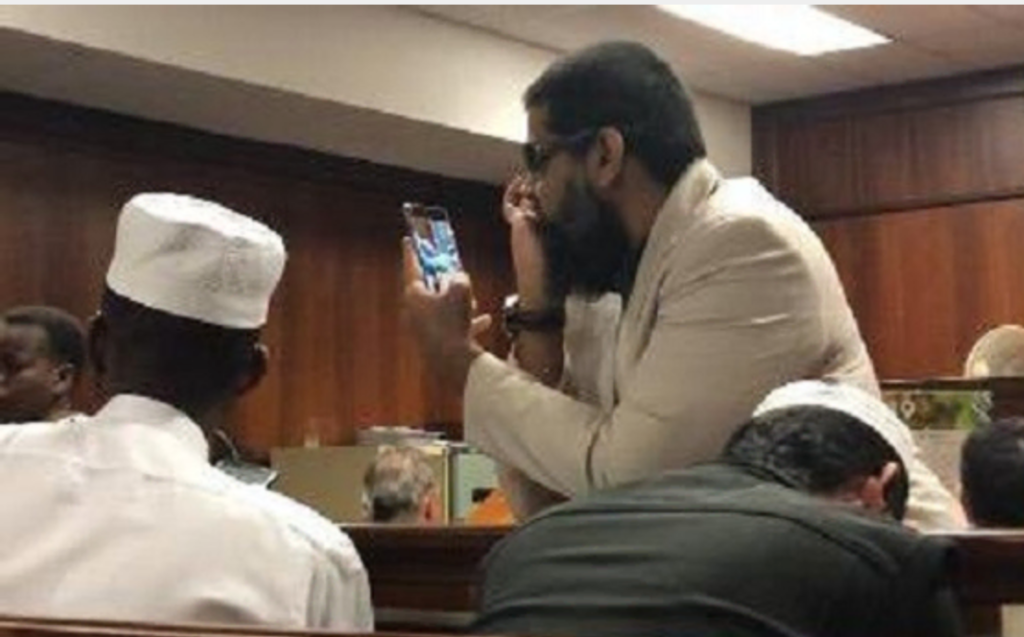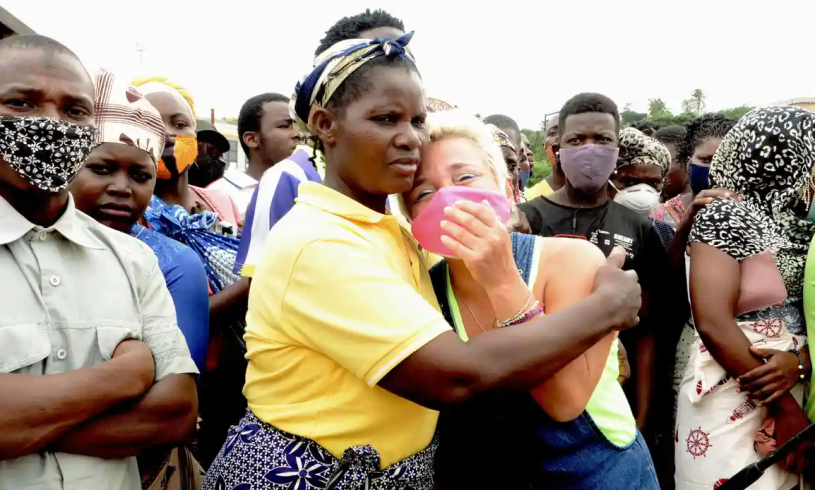The US Treasury has named and imposed sanctions on what it says are “four ISIS and ISIS-Mozambique (ISIS-M) financial facilitators in South Africa.”
Farhad Hoomer, Siraaj Miller, Abdella Hussein Abadigga, and Peter Charles Mbaga are being designated pursuant to E.O. 13224, as amended, which targets terrorist groups and their supporters, among others.
ISIS members and associates in South Africa are playing a role in facilitating the transfer of funds from the top of the ISIS hierarchy to branches across Africa. Those designated today have provided financial support or served as leaders of ISIS cells in South Africa. ISIS and ISIS-M are distinct and separately-designated Foreign Terrorist Organization (FTOs) under the Immigration and Nationality Act (INA) and Specially Designated Global Terrorists (SDGTs) pursuant to E.O. 13224, as amended.
ISIS has attempted to expand its influence in Africa through large-scale operations particularly in areas where government control is limited. ISIS branches in Africa rely on local fundraising schemes such as theft, extortion of local populations, and kidnapping for ransom as well as financial support from the ISIS hierarchy.
We are taking today’s action to further disrupt and expose key ISIS and ISIS-M supporters who raise revenue for ISIS and exploit South Africa’s financial system to facilitate funding for ISIS branches and networks across Africa.
US STATE DEPARTMENT
This is from a blog by Frontier Post
F.P. Report
WASHINGTON: The U.S. Department of the Treasury’s Office of Foreign Assets Control (OFAC) designated four Islamic State of Iraq and Syria (ISIS) and ISIS-Mozambique (ISIS-M) financial facilitators based in South Africa.
ISIS members and associates in South Africa are playing an increasingly central role in facilitating the transfer of funds from the top of the ISIS hierarchy to branches across Africa. The South Africa-based ISIS members designated today pursuant to Executive Order (E.O.) 13224, as amended, have provided support for the aforementioned transfers or served as leaders of ISIS cells in South Africa.
“Treasury is taking this action to disrupt and expose key ISIS supporters who exploit South Africa’s financial system to facilitate funding for ISIS branches and networks across Africa,” said Under Secretary of the Treasury Brian E. Nelson. “The United States is working with our African partners, including South Africa, to dismantle ISIS financial support networks on the continent.”
ISIS has recently attempted to expand its influence in Africa through large-scale operations in areas where government control is limited. ISIS branches in Africa rely on local fundraising schemes such as theft, extortion of local populations, and kidnapping for ransom, as well as financial support from the ISIS hierarchy.
Illicit activities in South Africa, The democratic Republic of the Congo, and Mozambique
Between 2017 and 2018, Farhad Hoomer helped organize and begin the operations of a Durban, South Africa-based ISIS cell. Hoomer, who is the leader of the Durban-based ISIS cell, has provided some of his known residential properties and vehicles registered in his name to sponsor the cell’s meetings and operational activities. In his role, Hoomer claimed to have recruited and trained cell members and was in contact with members of ISIS-Democratic Republic of the Congo (ISIS-DRC) and ISIS supporters throughout South Africa. Hoomer raised funds through kidnap-for-ransom operations and extortion of major businesses, which provided more than one million South African rand in revenue for his cell. In 2018, South African authorities arrested Hoomer along with his associates for their involvement in a plan to deploy improvised incendiary devices near a mosque and commercial and retail buildings.
Siraaj Miller, who leads a Cape Town-based group of ISIS supporters, has provided financial assistance to ISIS by training members to conduct robberies to raise funds for ISIS. In 2018, Miller also aided in acquiring temporary safe houses for ISIS.
Abdella Hussein Abadigga has recruited young men in South Africa and sent them to a weapons training camp. Abadigga, who controlled two mosques in South Africa, used his position to extort money from members of the mosques. Abadigga sent these funds via a hawala to ISIS supporters elsewhere in Africa. Bilal al-Sudani, a U.S.-designated ISIS leader in Somalia, considered Abadigga a trusted supporter who could help the ISIS supporters in South Africa become better organized and recruit new members.
Peter Charles Mbaga facilitated funds transfers from South Africa. Mbaga sought to provide support to ISIS-M by helping the group procure equipment from South Africa. Mbaga also sought to procure weapons from Mozambique.
Farhad Hoomer, Siraaj Miller, and Abdella Hussein Abadigga are being designated pursuant to Executive E.O. 13224, as amended, for having materially assisted, sponsored, or provided financial, material, or technological support for, or goods or services to or in support of, ISIS.
Peter Charles Mbaga is being designated pursuant to Executive E.O. 13224, as amended, for having materially assisted, sponsored, or provided financial, material, or technological support for, or goods or services to or in support of, ISIS-M.
SANCTIONS IMPLICATIONS
As a result of today’s action, all property and interests in property of the individuals named above, and of any entities that are owned, directly or indirectly, 50 percent or more by them, individually, or with other blocked persons, that are in the United States or in the possession or control of U.S. persons, must be blocked and reported to OFAC. Unless authorized by a general or specific license issued by OFAC or otherwise exempt, OFAC’s regulations generally prohibit all transactions by U.S. persons or within the United States (including transactions transiting the United States) that involve any property or interests in property of designated or otherwise blocked persons. The prohibitions include the making or receiving of any contribution of funds, goods, or services to or for the benefit of those persons
Furthermore, engaging in certain transactions with the individuals designated today entails risk of secondary sanctions pursuant to E.O. 13224, as amended. Pursuant to this authority, OFAC can prohibit or impose strict conditions on the opening or maintaining in the United States of a correspondent account or a payable-through account of a foreign financial institution that has knowingly conducted or facilitated any significant transaction on behalf of a SDGT.
The power and integrity of OFAC sanctions derive not only from its ability to designate and add persons to the List of Specially Designated Nationals or Blocked Persons (“SDN List”), but also from its willingness to remove persons from the SDN List consistent with the law. The ultimate goal of sanctions is not to punish, but to bring about a positive change in behavior. For information concerning the process for seeking removal from an OFAC list, including the SDN List, please refer to OFAC’s Frequently Asked Question 897.
Alleged terrorist Farhad Hoomer kicked out of Islamic conference
Source: IOL
By Charlene Somduth Nov 1, 2019
 Farhad Hoomer in Court
Farhad Hoomer in Court
Durban – Farhad Hoomer claims he is being treated like an outcast by sections of the Muslim community. This after he was kicked out of an Islamic conference and allegedly labelled a “terrorist” by the organisers.
Hoomer, 42, a businessman from Overport, Durban, is facing a charge of terrorism in the Verulam Magistrate’s Court. He is also accused of having links to the militant group Islamic State.
The father of eight said he was shocked and hurt when he was prevented from attending the Southern African Ulama Forum Conference hosted by the Darul Ihsan Humanitarian Centre at the Crescent Hall in Parlock.
The conference was set down for two days – October 19 and 20 – and, according to Hoomer, the public was invited to attend via radio.
He attended the conference on Saturday and was welcomed by other guests. However, when an official noticed his presence, Hoomer claimed he was asked to leave.
He said he left the conference to attend prayer at a nearby mosque. After the prayer he noticed an official taking pictures of him with a cellphone, but he didn’t do anything about it. He returned the next morning but was stopped at the entrance of the parking lot.
“The official told me I was not allowed in the area. When I questioned him, he said I was a terrorist and I was affiliated to Isis. The official added that those in charge of the conference did not want to allow me in.”
Hoomer refused to leave the venue and asked to see the officials in charge.
He said five officials subsequently met him, together with members of the police and a private security company.
“They again asked me to leave. I told them I wanted clarity on why I was not allowed to attend the conference. They promised to arrange a meeting for us to discuss the matter.”
Hoomer said he left the conference but felt like an outcast.
“I was hurt and what shocked me the most was that this was an Islamic event. Before my arrest, I was welcomed by this organisation. We have prayed shoulder to shoulder together. Now, all of a sudden, I am an outcast. The court is yet to determine if I am innocent or guilty but the organisers have already found me guilty.”
Hoomer said he was confident he would be found not guilty.
“I was arrested just over a year ago and none of the maulanas or Islamic scholars have spoken to me or called me about the allegations against me. How do they now find me guilty without even speaking to me? How can they label me as a terrorist? They have already prosecuted, put me on trial and sentenced me.”
Hoomer has written to the centre seeking an apology but is yet to receive a reply.
“They never set up a meeting to clarify why I was not allowed into the conference.
“They need to apologise for the injustice they have caused and the fact that they have impaired me in front of people that morning.”
Hoomer was arrested in October last year in Reservoir Hills along with 17 other men. He has been accused of being the mastermind behind the attack on the Imam Hussain Mosque in Verulam in May last year.
The attack claimed the life of Abbas Essop.
The group is also accused of planting incendiary devices around Durban.
“The allegations levelled against me has put a strain on me and my family. I ran a property business and a diamond and gold business. I have lost R15million in revenue since I was arrested.”
Hoomer said he had only recently been granted permission to travel aboard for business.
“I am trying to get my businesses back on track. The majority of my suppliers and business affiliates have pulled out of business with me because I am now labelled as a terrorist.
“I was kept in custody for 53 days and this was emotionally traumatic for my eight children, four of whom are in school as well as my wives.”
Hoomer said he knows nothing about Isis or terrorism.
“These things are happening in Syria and Iraq. I cannot comment on them. One man’s terrorist is another man’s freedom fighter. Just look at the life of Nelson Mandela.”
The Darul Ihsan Humanitarian Centre said the Southern African Ulama Forum Conference was only for Islamic scholars.
Muhammad Ameer, the centre’s secretary, said the conference was part of a professional development programme.
“Being a conference of Islamic scholars, participation is strictly by invitation only and confined to individuals belonging to the fraternity. Delegates were required to register electronically. Only registered persons were allowed entry into the conference.”
However, certain individuals, added Ameer, served as volunteers and support personnel.
“Mr Hoomer arrived at the conference venue in Parlock on Sunday morning and insisted on being allowed to attend. He was intercepted by security at the entrance, denied entry and (was) requested to leave.”
Ameer said Hoomer was told about the attendance protocol and requirements and he left the venue.





















